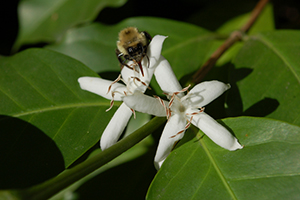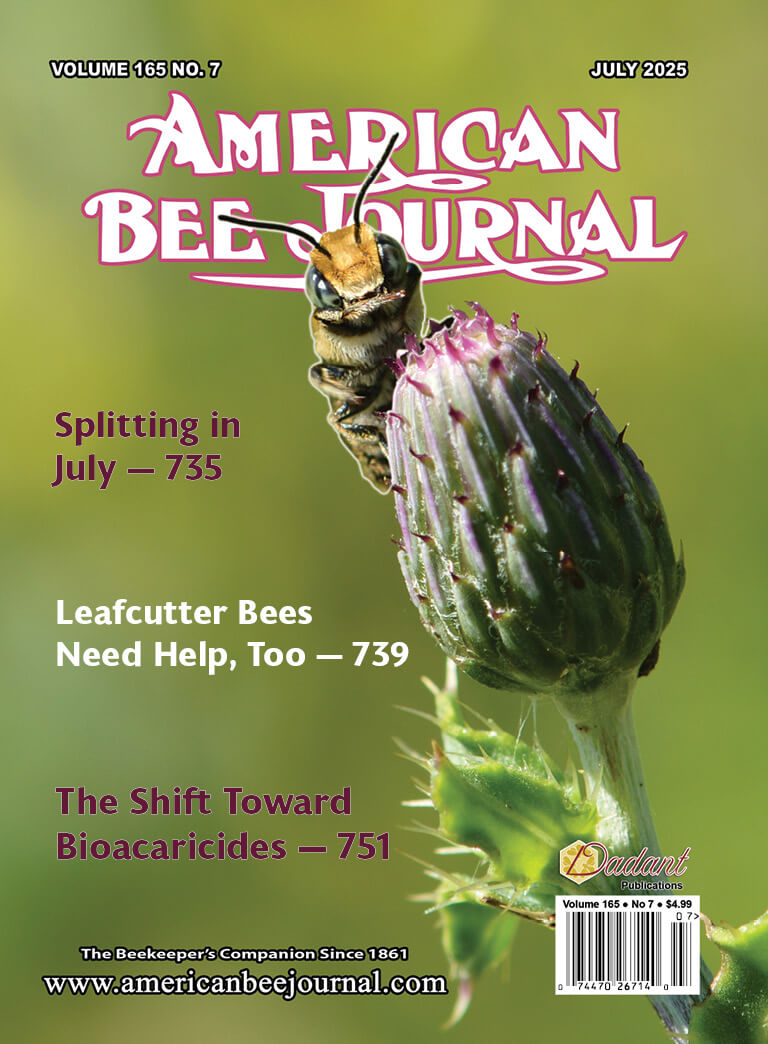
Bee Latte
A coffee tree on my porch draws an eager consumer this Sunday morning with a burst of fresh floral blend. Very few bees in my garden in Washington, D.C., I’m sorry to say. I’m happy to have this one.
John Bray
TheHoe.org
Editor Response
Hi John,
Neat photos — is that an ornamental, or does it also produce beans?
Eugene
Reply from John
The coffee trees produce cherries that contain the bean. I’ve tried to make coffee with the harvest, but it’s a laborious process. The trees really work better for me as an ornamental. They are quite beautiful and durable, with a subtle scent to the bloom and bright red cherries. I was thrilled to see a bee working the flowers.
John
Good Discussion
Dear Mr. Makovec,
You are a refreshing editor. American Bee Journal has always been a good magazine, but under your leadership it has become more balanced and much more interesting. The “Modern Farm Myths” series generated much discussion and back and forth. I appreciated reading another point of view from a knowledgeable person. I saw that many readers took issue with Charles Linder’s articles. You stated in the May issue that you had received many comments, more positive than negative, but I noticed you printed three negative comments and only one positive.
I live in the country surrounded by small scale farmers in southwest PA. I have been a beekeeper for 14 years. I generally have between 5-10 hives. I have not lost a hive in summer or winter for the past two years. (I hesitate to even make that statement out loud as nature may get me for my hubris.) Research continues across the country, but location, location, location and mite treatment probably has something to do with my success.
In the March 2019 issue, I thought “The Beekeeping Continuum” (I am closest to an organic backyard beekeeper) and “Are we talking about Pesticides too much” interesting. I found “Diagnosing a Dead-Out helpful.
I used to glance through the index of articles and sometimes barely read an article. It is taking me much longer to get through each issue produced since you became the editor.
Thank you and keep up the good work.
Lisa Laskow
Stahlstown, Pennsyslvania
Editor Response
Hi Lisa,
Thank you for your kind words. I’m sorry to be taking so much of your time these days. I also find myself spending hours on each issue in recent months, so I guess we’re in the same boat!
Eugene
Modern Farm Myths
In response to the Modern Farm Myths I had to make a reply based on what I have seen in my life. The usage of pesticide I do not agree with. As there is evidence that gets passed on down the food chain where we stand on the receiving end of it. Which points to our healthcare which I’m sure you are all aware of the process they call better and cheaper healthcare. With that in mind why is it failing to meet its goals?
You ask what has this to do with bees? The percentage of people dying and being cured is losing due to the diet of the people, which in turn points to the chemicals in our food and in the food of the animals we eat.
To say organic farming doesn’t have some faults would be false, but to say conventional is the way to go is wrong. You say not enough food for the population. Organic farms in my area equal or exceed conventional yields with higher prices at the market. That fact challenges Charles Linder’s train of thought; is what he’s saying actually so?
I think most of you would agree the bees are now to us what the canaries were to the coal miners. Is GMOs and pesticide usage the reason the bees can no longer tolerate high mite levels because of decreased nutrition? The point is I believe pesticides in our lives and food directly impact us, our health and our bees.
I just want to say thank you for publishing a great magazine. Plus a huge thank you to Randy Oliver for his extensive articles on mites and pesticides. Also Scott McArt for his latest research.
Trying to keep bees here in Ohio,
Merle Keim
P.S. More articles from Kirk Webster would be welcomed including other pioneers with mite resistant bees.
Greeks Love Their Honey
My husband and I just returned from a trip to Greece. We saw many hives along the roads; a common breakfast option there is a bowl full
….


